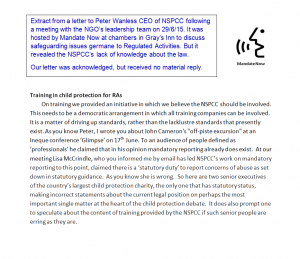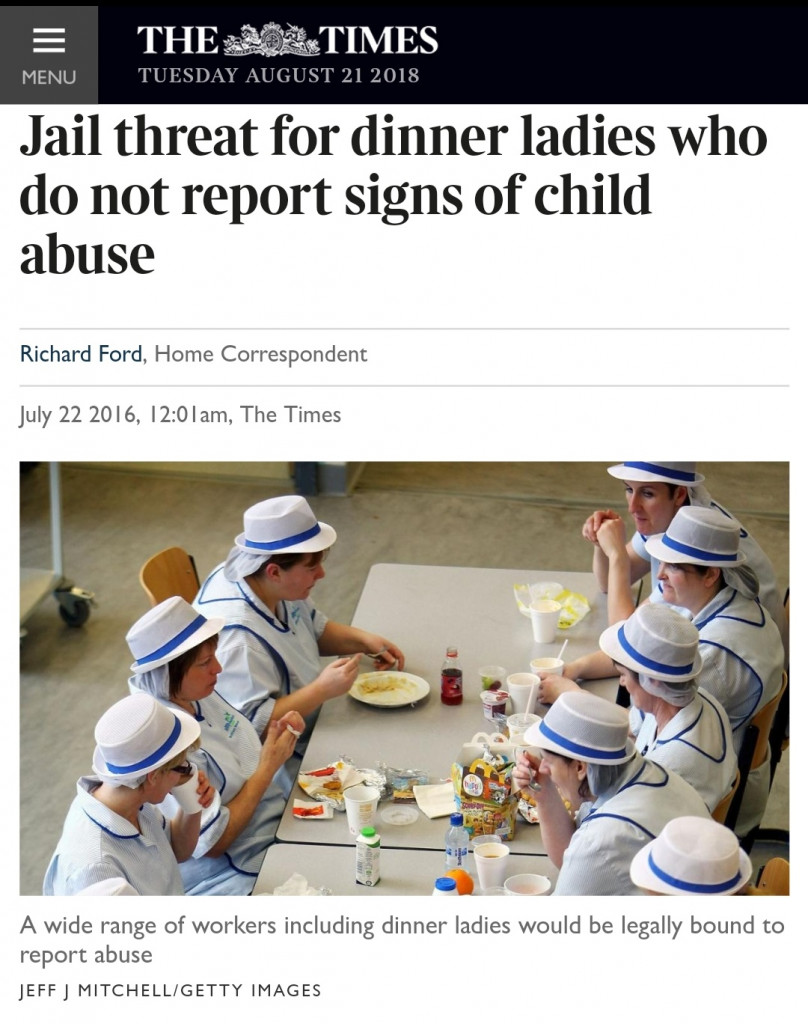A summary of IICSA MR Seminars 1 + 2 with some background.
In Spring 2018 many of us wondered if IICSA’s long promised mandatory reporting (‘MR’) seminar would ever happen. Well-designed MR is a key component of functioning safeguarding, particularly for Regulated Activities. It introduces responsibility and accountability to these strategically important institutional roles where only nominal responsibility and accountability exists presently. It’s in these settings that children spend most time after time with family. Importantly, and always overlooked, MR law also protects staff who are mandated to report known or suspected abuse. This rarely recognised element is as important as the obligation to report.
IICSA belatedly announced it would hold a one day MR seminar to be held on 27th September 2018. During the afternoon session a waterfall cascaded into the seminar room from the floor above which truncated the gathering. To that point it was a banquet of default institutional safeguarding speak that’s led us to the crisis that IICSA is belatedly attempting to address. A second seminar had been mooted for sometime, was extended by half a day to account for the interruption. It was eventually held in April 2019. Mandate Now was invited to both, as was the Department for Education.
Government is against the introduction of functioning Mandatory Reporting. It’s position is supported by both the NSPCC and Barnardos. To adopt this stance all three have to ignore empirical evidence while each simultaneously claim to be evidence led. In this article from May 2018 we provided the reasons that motivate the Government’s rejection of MR. Depressingly it has nothing to do with safeguarding children in these complex settings and everything to do with capping the number of referrals to Police and Local Authority. In the ‘Reporting and Acting on Child Abuse and Neglect’ consultation, the DfE and Home Office proposed ‘Duty to Act’ ( ‘DtA’ ). It’s a great title but is nothing like mandatory reporting. It was also without functioning precedent in any common law jurisdiction that we could find. Without a precedent there is no data. Government also provided no research to support its proposal. It was therefore reliant on the NGO’s to lend weight to its unviable initiative. Like two elderly Labradors the NSPCC and Barnardo’s pitched up, tails wagging to shore up the credibility of ‘DtA’ which incidentally was nothing more than the status quo in new clothes. We reviewed it in our submission and concluded it was a counterfeit, designed to mislead the well meaning and naive. We could say nothing positive about. It did though provide a haven for those in safeguarding who found themselves in a confused state when Government finally admitted, for the first time in writing, that there’s no law to report known or suspected child abuse in England and Wales.

Until these documents arrived in Parliament, the vast majority of people working in Regulated Activities, who in reality are only ‘nominally’ responsible for safeguarding in these settings, were convinced law existed. Below is another example of this unawareness, this time from the only children’s safeguarding charity with statutory status.

To not omit Barnardo’s from criticism here’s an example of its commitment to the safeguarding ‘statutory guidance.’ It simply ignored it in order to comply with a multi million pound contract with the Youth Justice Board to supply independent advocacy to children who were incarcerated at the Medway Secure Training Centre. It agreed to not refer safeguarding concerns arising in Medway to the Local Authority. In doing so it broke no law which reveals the inadequacy of the current safeguarding framework for Regulated Activities these NGO’s so enthusiastically support. This matter was raised in written evidence at IICSA. Coincidentally, the Youth Justice Board (a quango), is part funded by the Department for Education, the very Department responsible for the design of the safeguarding framework that Barnardo’s agreed to ignore.
The credibility of both NGO’s has to be questioned and most particularly their claim to be evidence led which both seem to forget when it’s convenient. MR is just one example. And here’s another, the NSPCC allegedly supported Government in the 1930’s in order to keep the number of child deaths secret from the public. This should really make people reassess the role of these organisations.
Barnardo’s was an invitee to the first MR seminar. Here is its submission to the consultation. It is against MR but sees merit in DtA that has no possibility of playing any role in improving safeguarding in Regulated Activities. The document is filled with the usual safeguarding clichés redolent of a weary organisation absent of chutzpah to lead any agenda other than being on time to catch the bus home. At the first seminar it was represented by someone who had formerly been employed by the NSPCC. We should all be concerned at the inter-changeability of personnel between the NGOs’ and the DfE. It’s unhealthy and promotes groupthink which shows. At MR seminar #1 Barnardo’s said nothing of relevance about Regulated Activity safeguarding and produced no evidence in support of what it did say. Its presence was a waste of a seat. IICSA seems to possess a certain sensitivity about appearances and to omit Barnardo’s or the NSPCC from the seminars would prompt questions. But serious questions need to be asked of these outfits. What did they contribute to the MR seminars? The same slurry they have been speaking for years which ensures they remain faithful Labradors to the Government. The Barnardo’s strap line is ‘We transform Lives‘, the NSPCC’s is ‘Every Childhood is worth fighting for.‘ Yet both organisations embrace the safeguarding status quo in Regulated Activities. Their inertia fails staff, children, parents and the State, which might come as a surprise to the Department for Education which is asleep at the wheel of this clattering train. Both NGO’s do this by averting their gaze to the empirical evidence in order to nuzzle the leg of Government in the hope they get a few pats on the head and some tidbits (including honours) for being faithful. Maybe the NSPCC should rewrite its strap line to –

Below is a list of invitees to MR Seminar #2. It was surprising that no LADO (Local Authority Designated Officer) attended either seminar. Other than the smaller survivor charities and Mandate Now, which is a pressure group and therefore not a charity, the seminar was replete with ‘policy wonks’ from larger organisations who deal with ‘safeguarding theory.’ They appeared uniformly unfamiliar with any of the research or data presented by Professor Mathews. Did any examine it before day 2? It didn’t seem so. They arrived with a position and left with it intact. But there was a tangible change in atmosphere in the afternoon when some delegates were perhaps realising their organisation may end up on the wrong side of history.
Thanks to a ruling from the Information Commissioner’s Office in our favour against the Home Office, Mandate Now secured all the submissions to ‘Reporting and Acting on Child Abuse and Neglect’ consultation. A few of the files turned over by the Home Office were omitted or jumbled as you will be able to see in a forthcoming post. Despite writing to the Home Office about it, their answer in abbreviated form was, ‘tough.’ Of the larger organisations at the seminar, all were against MR. The table below provides a link to their submissions where made. The consultation provided poor and limited data to potential respondents, almost exclusively grounded on familial abuse. The whole consultation process seemed designed to achieve one outcome – no change. Here is an example of press on the day following launch.

The majority of those who provided submissions inhaled the headline negatives from the consultation documents and vomited them into their submissions. Despite the consultation crash site, it is inconceivable that MR will not be recommended by IICSA. If IICSA does sidestep it, then what remains of the inquiry’s threadbare reputation will be ash. The weight of subject specific (Regulated Activity) evidence that demonstrates MR is a vital component of functioning safeguarding in Regulated Activities, is too great to ignore.
The table below does not work well on mobile unless you use auto rotate, our apologies. It’s easier on desktop.
MR Seminar Delegates 29/30 April 2019
| Organisation | Name / Role | For MR | Against MR | For DTA | Against DTA | Link to consultation submission |
|---|---|---|---|---|---|---|
| Association of Directors of Children's Services Day 1 Association of Directors of Children's Services Day 2 | Stuart Gallimore Past President Rachel Dickinson President | X | X (ish) | ADCS Submission | ||
| Association of School and College Leaders | Anna Cole Parliamentary Specialist | X | X (Para 8 + 34) | ASCL Submission | ||
| Barnardo's | Emily Cherry Assistant Director | X | X (ish) | Barnardos Submission | ||
| Chief Social Worker England | Isabelle Trowler Scheduled to attend Day 1 but did not | |||||
| Department for Education | Katy Willison Director of Children's Social Care, Practice and Workforce | |||||
| General Medical Council | Sharon Burton Head of Policy, Ethics and Standards | X | X (With reservations) | GMC Submission | ||
| Independent Schools Council | Simon Nathan | X | Y (ish) | Two part submission Part 1 Part 2 |
||
| Mandate Now | Tom Perry Founder | Y | X | Mandate Now Submission | ||
| Migdal Emunah | Yehudis Godsobel Founder | Y | ||||
| National Police Chiefs Council | D.Sup Michael Britton Staff Officer National Policing Lead for Child Protection and Investigation | X | X | NPCC Submission | ||
| NHS England | Moya Sutton MBE Senior Safeguarding Lead | X | X | NHS England Submission | ||
| NSPCC | Almudena Lara Head of Policy | X | Y | NSPCC Submission | ||
| One in Four | Michelle Denny Brown Clinical Lead and Wellbeing Coordinator | |||||
| Queensland University of Technology | Professor Ben Mathews | |||||
| Respond | Noelle Blackman Chief Executive | Y | ||||
| Save Association | Paul Stewart Co Founder | |||||
| Scout Association | Tina Wilson Head of Safeguarding | X | X | Scout Association Submission | ||
| Welsh Government | Albert Heaney Director of Social Services and Integration | Mr Heaney claimed on day 2 that Wales now has MR. It does not. The suggestion is nonsense. |
Shortly after publication of the inquiry’s final report (20.10.22), its You Tube account was closed.
Includes first presentation by Prof Ben Mathews on MR
Here is video of proceedings for the first (half) day which consisted two presentations by Professor Ben Mathews with questions that followed.
Includes second presentation by Prof Ben Mathews on MR
The videos of these sessions have now been removed by IICSA.
Slides used in Mathews Presentation 1
Slides used in Mathews Presentation 2